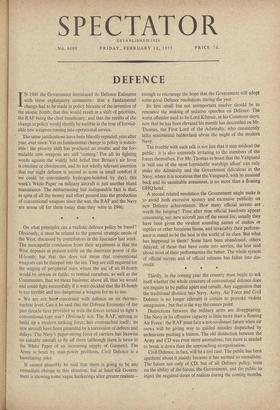DEFENCE
IN 1946 the Government introduced its Defence Estimates with three explanatory comments : that a fundamental change had to be made in policy because of the invention of the atomic bomb; that this would result in a shift of priorities, the RAF being the chief beneficiary; and that the results of the change in policy would shortly be audible in the roar of formid- able new weapons coming into operational service.
The same justifications have been blandly repeated, year after year, ever since. Yet no fundamental change in policy is notice- able: the priority shift has produced no results; and the for- midable new weapons are still 'coming.' For all its fighting words against the widely held belief that Britain's air force is obsolete or obsolescent, and its not wholly relevant assertion that our night defence is second to none (a small comfort if we could be conveniently hydrogen-bombed by day), this week's White Paper on military aircraft is just another bland reassurance. The embarrassing but indisputable fact is that, in spite of all the money and effort poured into the production of conventional weapons since the war, the RAF and the Navy are worse off for them today than they were in 1946.
On what principles can a realistic defence policy be based? Obviously, it must be related to the general strategic needs of the West, discussed by contributors in the Spectator last week. The inescapable conclusion from their arguments is that the West depends at present solely on the deterrent power of the H-bomb; but that this does not mean that conventional weapons can be dumped into the sea. They are still required for the waging of peripheral wars where the use of an H-bomb would be unwise or futile; to remind ourselves, as well as the Communists, that we mean business; above all, that we would and could fight successfully if it were decided that the H-bomb is too terrible and too dangerous a weapon for us to use.
• We are not here concerned with defence on its thermo- nuclear level. Can it be said that the Defence Estimates of the past decade have provided us with the forces needed to fight a conventional-type war? Obviously not. The RAF, striving to build up a modern striking force, has overreached itself : its new aircraft have been grounded by a succession of defects and delays. The Navy's paper-strong force of carriers has likewise no suitable aircraft to fly off them (although there is news in the White Paper of an increasing supply of Gannets). The Army is beset by man-power problems. Civil Defence is a humiliating joke.
It cannot plausibly be said that there is going to be any immediate change in this situation, but at least ti,e Govern- ment is showing some vague hankerings after greater realism— enough to encourage the hope that the Government will adopt some good Defence resolutions during the year.
Its first small but not unimportant resolve should be to renounce the making of qedative speeches on Defence. The worst offender used to be Lord Kilmuir, in his Commons days; now that he has been elevated his mantle has descended on Mr. Thomas, the First Lord of the Admiralty, who consistently talks sentimental balderdash about the might of the modern Navy.
The trouble with such talk is not just that it may mislead the public : it is also extremely irritating to the members of the forces themselves. For Mr. Thomas to boast that the Vanguard is 'still one of the most formidable warships afloat' can only make the Admiralty and the Government ridiculous in the Navy, where it is notorious that the Vanguard, with its strained back and its unsuitable armament, is no more than a floating GHQ hotel.
A second related resolution the Government might make is to avoid both excessive secrecy and excessive publicity on new Defence achievements. How many official secrets are worth the keeping? Time after time official handouts appear concerning, say, new aircraft just off the secret list; usually they have been given the virulent sounding names of snakes or reptiles or other ferocious fauna, and invariably their perform- ance is stated to be the best in the world of its class. But what has happened to them? Some have been abandoned; others delayed; of those that have come into service, the less said about most of their performances the better. The whole system of official secrets and of official releases has fallen into dis- credit.
* *
Thirdly, in the coming year the country must begin to ask itself whether the whole structure of conventional defence does not require to be pulled apart and rebuilt. Any suggestion that the traditional division into Navy, Army, Air Force, and Civil Defence is no longer relevant is certain to provoke violent antagonism : but that is the way the omens point.
Distinctions between the military arms are disappearing. The Navy in its offensive capacity is little more than a floating Air Force : the RAF must face a not-so-distant future when air crews will be giving way to guided missiles dispatched by technicians pushing a button. The old distinction between the Army and CD was even more anomalous; but more is needed to break it down than the approaching reorganisation.
Civil Defence, in fact, will be a test case. The public has been apathetic about it mainly because it has seemed so unrealistic. The future not only of cD, but of all Defence policy, rests on the ability of the forces, the Government, and the public to inject the required doses of realism during the coming months.










































 Previous page
Previous page